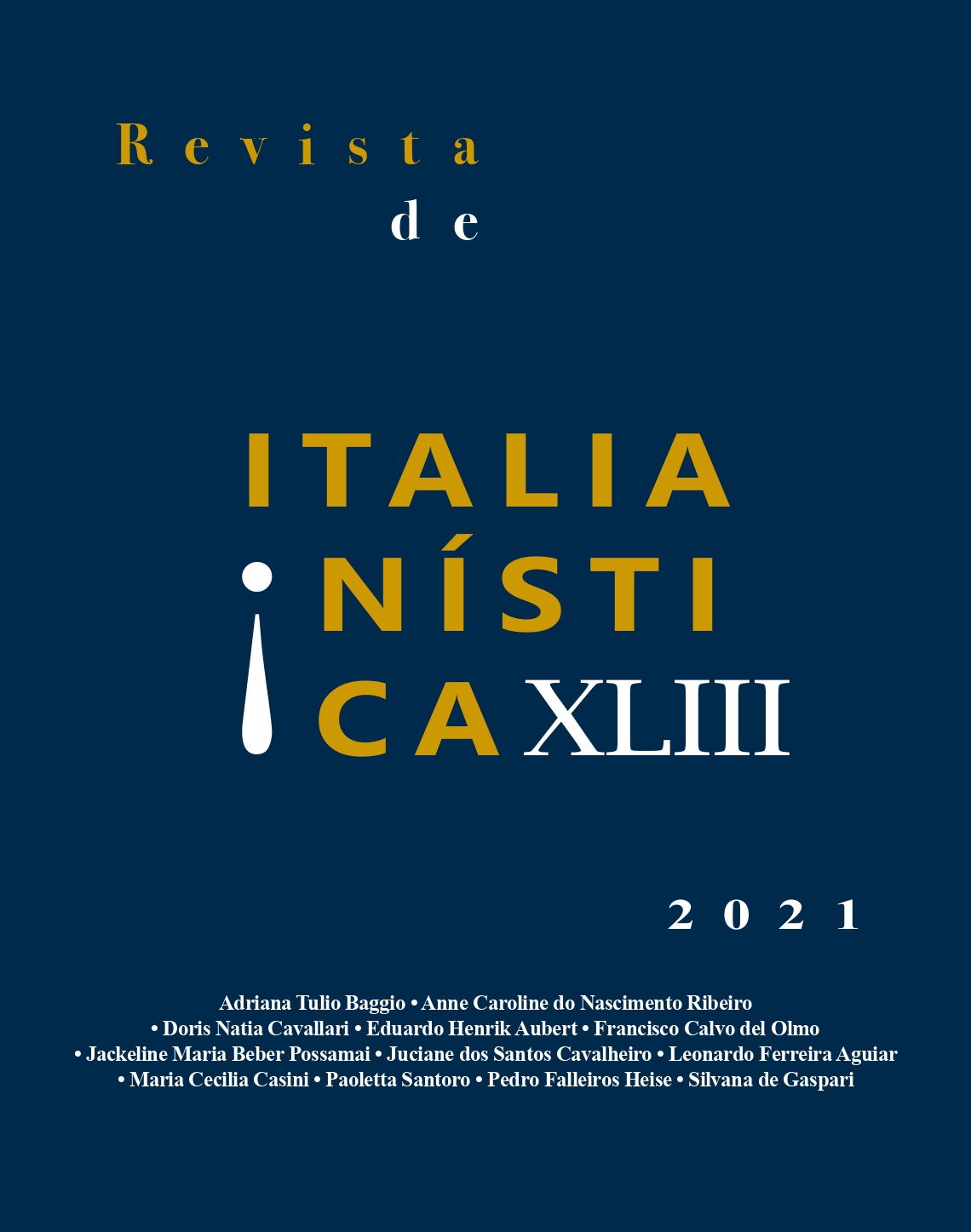Where does Dante's journey lead us?
DOI:
https://doi.org/10.11606/issn.2238-8281.i43p23-35Keywords:
Dante Alighieri, Journey, Dialogue, Free will, IndividualAbstract
Italy and its national language owe much to the revolutionary act of a poet who dared to break through the barriers of the known world and enter, first person, into the mysteries of another life, that expected, unknown and feared “al di là”, starting from tradition (Virgilio) to reach the “new life”, where matter becomes light. On his journey, the pilgrim poet passes through Hell, where ancient monstrous and fierce creatures punish the passions and illusions of pride, possession, greed; through Purgatory, the world of the middle that is also a means of liberation from illusions, a realm in which melancholy unites with hope; at the end of it, the poet reaches the earthly Paradise, because his will is “liberao, dritto and sano” and allows him to ascend to Paradise, the realm in which “ben dell'intelletto” and contemplation combine with growing lucidity, where communion with the divine becomes real. At the end of his search, “being with God” makes the human desire to be filled with divinity (il mio disio e il velle, / sì come rota ch’igualmente è mossa / l'Amor che move il sole e l' altre stelle). Upon reaching the "end point", Dante seems to clarify the doubts and fears of the men of his time, finally sealing the doors of the ancient world and its forms of representation, to lead us to the modern world, to Humanism, the time in which the individual he is in contact with nature, with history and the poet in constant dialogue with his work and his reader.
Downloads
References
AGUIAR, F. Visões do inferno ou o retorno da aura. In: NOVAES, A. O olhar. São Paulo: Companhia das Letras, 1997.
ALIGHIERI, D. La Divina Commedia. (organização, introdução, notas e comentários de Anna Maria Chiavacci Leonardi). Bologna: Zanichelli, 2010.
ALIGHIERI, D. A Monarquia. Trad. Introdução e notas de Hernâni Donato. São Paulo: Ícone, 2006.
ARIÈS, P. História da morte no Ocidente. Da Idade Média aos nossos dias. Trad. Priscila Viana de Siqueira. Rio de Janeiro: Ediouro, 2003 [primeira edição no original francês: 1975].
ASOR ROSA, A. La fondazione del laico. In: Genus Italicum. Saggi sulla identità letteraria italiana nel corso del tempo. Torino: Einaudi, 1997, p. 33 a142.
BARBERO, Alessandro. Dante (Italian Edition) (p. 128). Bari-Roma: Editori Laterza, Edizione digitale (Kindle): settembre 2020.
CAVALLARI, D.N. Autor ou autoridade: Dante e a narrativa como superação. In: Revista In arte. São Paulo: Colégio Dante Alighieri, 2015. Disponível em: https://www.colegiodante.com.br/wp-content/uploads/2015/11/InArte2015.pdf. Acesso em: 18/10/2021.
CURTIUS, E.R. Literatura Europeia e Idade Média Latina. Trad. Paulo Rónai e Teodoro Cabral. São Paulo: Edusp, 1996. [edição de referência em alemão: 1984, primeira edição : 1948].
DE SANCTIS, F. Saggi e lezioni su Dante. Torino, Einaudi, 1955.
HUYGHE, R. O poder da imagem. Trad. Helena L. Santos. São Paulo: Martins Fontes, 1986.
KELSEN, H. A teoria do Estado de Dante Alighieri. Trad. Luiz Felipe B. Osório. SãoPaulo: Editora Contracorrente, 2021.
LE GOFF, J. & SCHMITT, J-C. Dicionário temático do ocidente medieval. Vol II. Bauru, SP: EDUSC; São Paulo, SP: Imprensa Oficial do Estado, 2002. (verbete Morte e mortos, por Michel Lauwers, p. 243-261)
VILLELA, Felipe Stiebler Leite, “O caminho da nossa vida, uma aproximação entre Ser e tempo e Divina comédia”. Mestrado em Filosofia, Pontifícia Universidade Católica, São Paulo, 136 f., 2010. Disponível em: https://sapientia.pucsp.br/handle/handle/11835. Acesso em: 4/4/2019.
VIVAI BARTOLINI SALIMBENI, C. Memórias de mercadores na Florença comunal do século XIV: os Livros de Família e as “Ricordanze” de Leonardo di Bartolino Salimbeni. Tese (Doutorado em Letras, Língua, Literatura e Cultura Italianas) Universidade de São Paulo, São Paulo, 428 f., 2020. Disponível em: https://www.teses.usp.br/teses/disponiveis/8/8148/tde-19022021-165849/pt-br.php. Acesso em: 08/10/2021.
Dante, Shakespeare e Marco Polo: dividere il mondo in buoni e cattivi. In: Corriere della sera, 28/03/2021. Tradução /adaptação do texto de Arno Widmann. Disponível em: https://www.corriere.it/esteri/21_marzo_28/dante-shakespeare-marco-polo-dividere-mondo-buoni-cattivi-f90ff5a8-8fef-11eb-bb16-68ed0eb2a8f6.shtml. Acesso em: 1/10/2021.
Articolo su Dante di Arno Widmann: Errori di traduzione del Corriere della Sera. Disponível em: http://www.attomelani.net/index.php/2021/03/30/articolo-widmann-errori-traduzione-corriere-della-sera/. Acesso em: 15/08/2021.
Downloads
Published
Issue
Section
License
Copyright (c) 2021 Revista de Italianística

This work is licensed under a Creative Commons Attribution-NonCommercial-NoDerivatives 4.0 International License.
A revista retém os direitos patrimoniais dos artigos e os publica simultâneamente sob uma Licença Creative Commons-Atribuição-Não Comercial-Sem Derivações.



